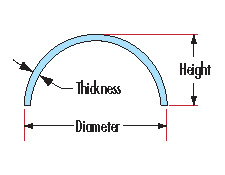Dome lenses are hemispheres. The two optical surfaces are an equal thickness apart, creating a naturally strong shape that gets tougher under pressure. This makes dome windows ideal for underwater environments and in applications such as camera dome ports and submersible windows.
BK7 or K9L domes are used primarily in meteorology applications. BK7 offers excellent transmission from 300nm up to 2µm. BK7 is a relatively hard material, with excellent chemical durability.
UV fused silica domes ( JGS1 ): For applications operating in the deeper UV range, we offers a range of UV fused silica domes. Fused silica domes are commonly used in underwater applications at extremely high pressures.
Sapphire domes: For infrared applications we can provide sapphire domes. Sapphire is an extremely hard material with transmission of over 80% in the 2-5µm wavelength range. As with fused silica, sapphire is able to withstand extreme pressures, making it the perfect material for underwater camera and missile fairing applications.

Specifiation of our dome lens as follow:
Material:Optical glass N-BK7 , H-K9L, UV Fused Silica, Sapphire, and infrared crystal materials.
Diameter:20-350mm
Diameter Tolerance:+/-0.1mm
Thickness:>2mm
Thickness Tolerance±0.2~0.1mm
Center Deviation:3-5'
Surface quality:80/50 60/40
Coating: Antireflection Coating inside or both sides
Chamfers:0.2 x 45° typical
Hk9 Glass Dome Lens,Hk9 Hemisphere Domes Lens,Hemispheric Glass Dome Lens,Optical K9 Glass Dome Lens
China Star Optics Technology Co.,Ltd. , https://www.csoptlens.com